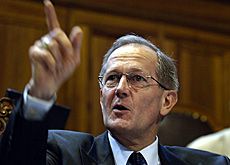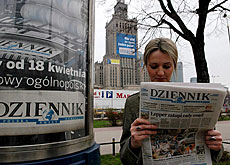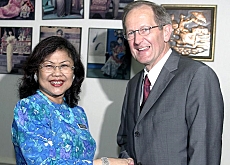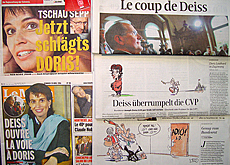Deiss confirms his pro-European Union stance

Swiss Economics Minister Joseph Deiss, who retired on Monday, says Switzerland's integration into Europe has been too slow.
Deiss, aged 60 and a member of the Christian Democratic Party, tells swissinfo that Switzerland’s interests would be better served as a member of the European Union.
He says Switzerland should be more aware of its economic power and could contribute more at the political level in today’s globalised world.
Deiss also criticises those conservative Swiss who do not look beyond the country’s borders.
swissinfo: The government published its European policy report at the end of June. Is Switzerland moving in the right direction in its bilateral approach, steering clear of EU membership for the time being?
Joseph Deiss: If you look at this report, you will see that all options remain open. This is really important because it’s difficult to know what the situation will be in 20, 30 or 50 years’ time.
We have been able to achieve major improvements in integration into the EU economy – think of the 20 major agreements we have: some are fundamental, not only on free trade, but also on the free movement of labour, for example.
We also have 200 minor agreements with the EU so we can say we are moving in the right direction. The question is whether it is the right speed or not.
swissinfo: And what’s the answer to that?
J.D.: The government’s answer is to say that we see no other way other than the bilateral way to best seize and defend our interests.
If you ask me personally, I consider the speed as too slow and it’s clear to me that our interests will much better be served when we are members of the EU…
Since people knew that I was in favour of membership before entering the government, it’s important for me that when leaving – even if I had to pursue the policy of the government – I still have the same conviction.
swissinfo: Opinion polls show strong opposition to government plans to contribute SFr1 billion ($845 million) to the EU’s Cohesion Fund to help the ten newest EU members. A referendum is being held in November on the issue. What do you say to opponents?
J.D.: We are not going to pay into this fund. We want our contribution to be an independent action on a bilateral level between Switzerland and Poland, and Switzerland and Slovakia and so on.
We have no agreement with the European Union. What we have is a memorandum of understanding that sets out the general conditions of the Swiss commitment to the ten new EU member states…
We are doing what we have being doing for years, namely helping the countries of the former Soviet Union and of the former republic of Yugoslavia to join the level and intensity of free economic relations we have in western Europe or in northern America.
The main message is to say that we are getting a lot of advantages through the fact that these economies are now emerging, stabilising and strengthening. This is an act of solidarity with the other EU members to help implement this big project.
swissinfo: Will Switzerland one day become a member of the EU?
J.D.: Yes.
swissinfo: A project for a free trade agreement between Switzerland and the US failed to get off the ground earlier this year. Instead an accord for a forum on strengthening trade and investment was signed in May. Were you disappointed?
J.D.: I regret that we were not able to enter negotiations with the US about a free trade agreement. Nevertheless, I must say that the outcome is very positive. I’m very happy that we now have a body within which it will be possible to address all the major questions that crop up in our bilateral relations with the US at the economic level.
swissinfo: What do you consider the highpoints during your time in office?
J.D.: On domestic issues [I would mention] the economic growth programme, which is now increasingly bearing fruit, and the healthy situation of today’s economy. It’s a clear improvement on when I started.
On the international level, we also have major achievements, for example membership of the United Nations. Also the bilateral agreements with the EU were a success. We won several difficult referendums. I was also able to help shape a new strategy for our country that adds a new dimension of bilateral agreements, the latest concluded with South Korea and the South African Customs Union.
swissinfo: What about disappointments?
J.D.: I deplore sometimes that our country misses out where things happen and where Switzerland’s interests are at stake, so I would like the country – if I can borrow the soccer metaphor – not only to participate in World Cups, but also to shoot penalties.
swissinfo: If you’re shooting penalties, you want to win, so where do you want Switzerland to win or be more assertive in the future?
J.D.: I think we should first concentrate on those issues where we are a big player, so it’s particularly in economic fields. Switzerland is in some respects one of the most important players, for example in foreign direct investment.
I would like Switzerland to be much more aware of its power. I think we also have much to contribute on the political field. We did it, for example, in the UN with the new Human Rights Council. We are able to do that in more situations.
I don’t understand those in my country who think that Switzerland should be inward-oriented, take care of its interests at home and forget that today in a global world things are decided outside our country. This is something we could advance more.
swissinfo: What’s next? As a former economics minister and professor of economics there will surely be no shortage of Swiss companies wanting to put your knowledge and connections to good use.
J.D.: We’ll see. I’m open.
swissinfo-interview: Robert Brookes
Joseph Deiss was born in Fribourg in 1946.
The professor of economics was a member of canton Fribourg’s cantonal parliament from 1981-1991.
He also served as mayor of the Fribourg village, Barberêche, from 1982-1996.
Deiss was elected to Switzerland’s House of Representatives in 1991, and was the Swiss price regulator from 1993-1996.
He joined the cabinet in 1999 as foreign minister, and took over the economics portfolio in 2003.
Joseph Deiss took many people by surprise when he announced his resignation on April 27, saying he was stepping down to make way for new blood. He is to be replaced by the party president of the Christian Democrats, Doris Leuthard.
Executive power in Switzerland is vested in the seven-member cabinet. Members are elected, re-elected or – extremely rarely – dismissed by parliament.
Elections for a new legislature are held every four years. The 2003 parliamentary elections upset the so called, “Magic Formula”, which dictated the cabinet makeup for more than 40 years.
The success of the Swiss People’s Party at the polls allowed them to claim a second cabinet seat, taking one of the two seats traditionally held by the Christian Democrats.
The Radicals and Social Democrats each hold two of the other four seats.

In compliance with the JTI standards
More: SWI swissinfo.ch certified by the Journalism Trust Initiative



You can find an overview of ongoing debates with our journalists here. Please join us!
If you want to start a conversation about a topic raised in this article or want to report factual errors, email us at english@swissinfo.ch.